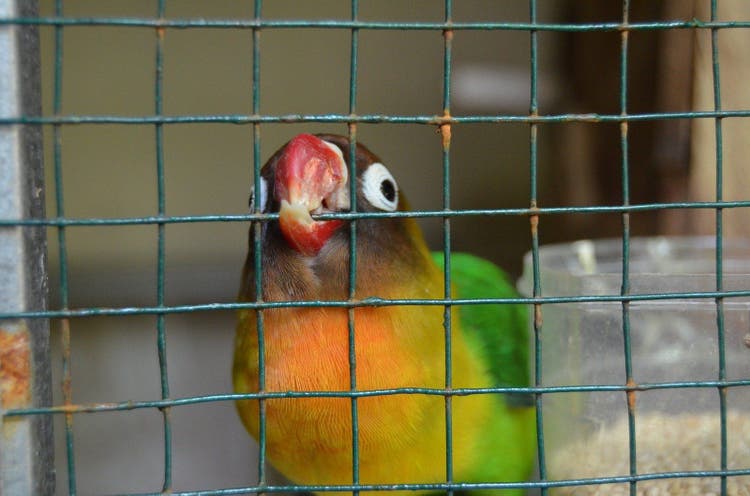
A Beginner’s Guide to Bird Cages
You’re probably very excited about your new bird. Congrats! However, your excitement might be tempered slightly the when you’re in the bird cage aisle overwhelmed by all of the different types and sizes of cages, with the price varying quite a bit depending on which one you go with. Small cages range from $35 to $100 while larger ones run between $200 to $300. Some can run for more than that. Custom-designed, solid brass top-of-the-line house, costs can soar to $3,000. But, whatever your budget, there are certain standards a safe, comfortable cage must meet. This post will provide you with an overview on things to consider when selecting your bird cage.
Size
Though many of us would say that we’d love to live in a bigger house, when it comes to birds, bigger is not always the best choice. The size of cage you choose should correlate directly with the size of bird you have. Smaller birds like parakeets and finches should have smaller cages, while larger birds like parrots and macaws require larger cages. Obviously, large birds, such as parrots and macaws, need more room than smaller canaries and finches, but all birds require some space to stretch. A good rule of thumb it to allow your bird to have two to three times their wingspan in width and for length have three times the height from head to tail.
Certain birds will require different cages. Some birds are more active than others and will want to room to move around, while some birds won’t feel comfortable will all of the open space. One thing you’ll want to consider when you’re buying a cage is to make sure that the cage isn’t made of lead or zinc, which can be harmful to your bird. Older cages were made of these materials before manufacturers knew about the dangers.
Bird Cage Accessories
Your bird cages should have plenty of toys and levels for your bird to keep entertained with. When you’re picking your bird cage you’ll want to make sure that you select one that will allow you to accessorize it over time. Some items that are popular bird toys include mirrors, bells, swings and ladders. Much in the way that dogs, cats, and even humans, tire with toys after a while, birds too might grow bored of them. Switching them in and out is a good way to keep your bird happy and entertained.
In addition to toys, add some perches for your bird to have a few areas to hang out. Find some perches made from untreated branches from bird-friendly trees, such as willow or hazelnut. Birds enjoy uneven branches as they allow exercise and keeping nails trimmed. If you need advice for spacing out the perches and toys, ask an employee at your local pet store. It’s usually a good idea to also select your feeding dishes with your cage to make sure it’s compatible.
Make It Sturdy
You want your bird cage to be sturdy. When you’re picking one out, check if the wire bars can withstand the wear and tear your bird will put on them. Large birds, such as macaws and cockatoos, need very strong cages as they create more pressure on the cage. Metal cages will hold up better than their plastic counterparts.
Bar spacing is also something to take into the equation. Spaces shouldn’t be so wide that the bird can slip through or get ahead or foot caught in between them. Birds are curious creatures, so you want to make sure that the cage doesn’t provide them an opportunity to get their foot or head wedged during an explorative mood. Though you can find doors that open vertically, it is recommended that you select a drop down or swing open cage.
Keep It Clean
Keeping your bird cage clean is one of the primary responsibility owning a bird. Find a cage that’s easy to clean, with surfaces you can wipe down and drawers, trays and grids you can easily access and remove for cleaning. Many cages will have a grate at the bottom so your birds waste drops through and your bird isn’t stomping around in his own remains. If you’re getting a baby bird, it’s smart to lay down some padding in case they take a tumble. Newspaper and soft towels do the trick.
Location, Location, Location
When you’re deciding where in your home to place your bird cage, consider a place with enough traffic that your bird won’t get lonely. Both you and your bird want to interact with each other, so placing the cage in as seldom entered bedroom or the basement isn’t always the best choice. Though a kitchen gets a plenty of traffic, avoid placing your cage here. Cooking fumes and gas can be dangerous for your bird to ingest.
Learn More About Your Bird At PetPlace
Getting your new bird is an exciting time. Follow the steps provided in this post in order to select the perfect bird cage for your bird. If you have questions that we didn’t cover, always ask your local pet store for some last minute advice. At PetPlace, we have thousands of vet-approved articles that will help you become a knowledgeable pet owner. If you’ve yet to nail down what type of bird you’re going to get, take a look at this post about life spans for common birds.